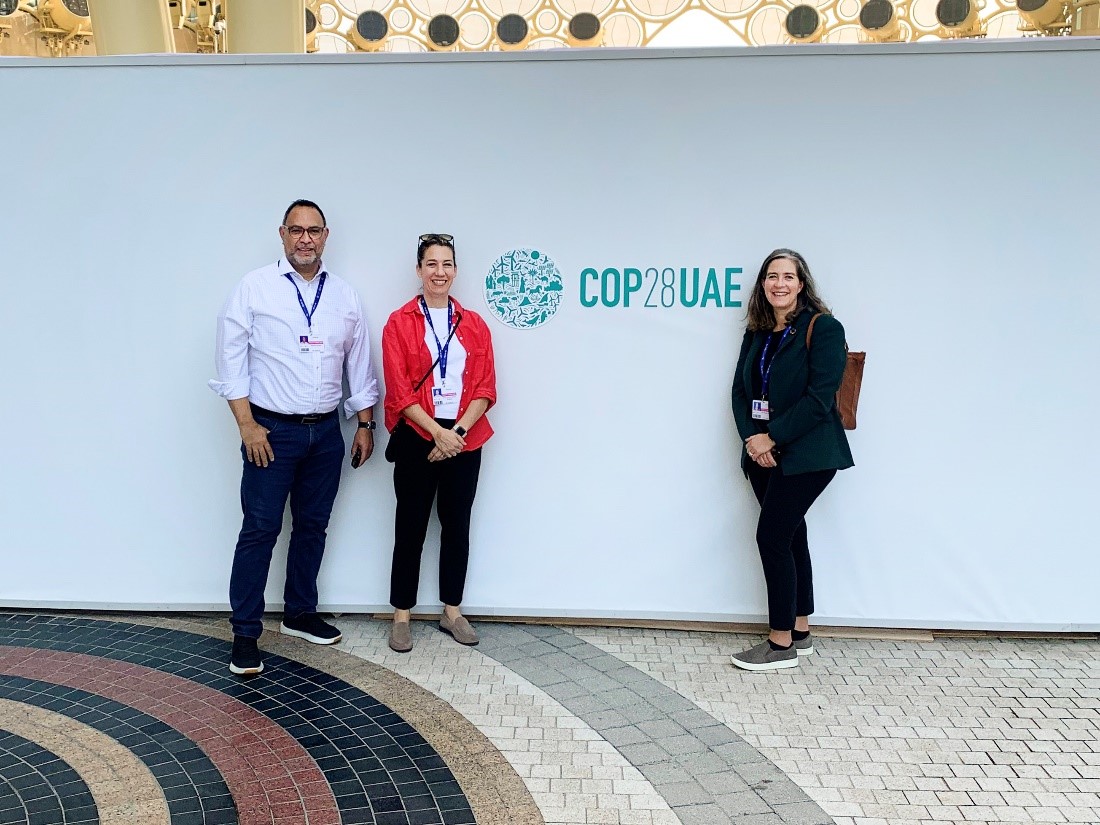
Paul, Alicia and Ara (far right) prepare for a day of meetings, panel discussions and networking at COP28 in Dubai in early December 2023.
For two weeks starting in late November, delegates from around the world convened in Dubai for the 2023 United Nations Framework Convention on Climate Change Conference, better known as COP28, to negotiate the global response to climate change. This was the largest COP gathering so far, nearly doubling last year’s attendance. And though Weyerhaeuser has participated in COP before, this year we elevated our presence and strategic engagement to capitalize on the growing momentum around our business and sustainability goals.
Our Weyerhaeuser team of Russell Hagen, senior vice president and chief development officer, Ara Erickson, vice president of corporate sustainability, Paul Hossain, vice president of natural resources and climate solutions, and Alicia Robbins, vice president of portfolio analytics and business development, joined nearly 100,000 attendees representing a diverse mix of environmental, policy and business interests.
We used meetings, panels, media interviews, networking events and more to lead and elevate conversations around natural climate solutions, forest carbon and the need for greater trust and transparency in the voluntary carbon market (VCM). Access to the “Blue Zone,” where the formal negotiations and conference proceedings took place, allowed our delegation to attend high-profile sessions with renowned experts, policymakers and world leaders and connect with global organizations – highlighting the unique and essential value of working forests and wood products in addressing the climate crisis.
Russell responds to a question during a panel discussion we co-hosted at COP28 with the World Climate Foundation on Dec. 4 titled “Fostering Trust and Investment in Natural Climate Solutions.”
THE URGENCY OF THE MOMENT
Climate change is a global threat that requires a systemic response, and working forests provide an immediate, natural and scalable opportunity to remove carbon dioxide from the atmosphere. As the largest private owner of timberlands in the United States, we have the ability and the responsibility to set the standard for high-quality, nature-based climate solutions – especially around forest carbon. In going to COP28, we set out to:
- Demonstrate our capabilities and expertise as a trusted climate-solutions provider
- Increase interest in and grow demand for nature-based climate solutions
- Raise awareness for the critical role forests play in fighting climate change
“Even though we are the largest private timberland owner in the country, we’re a small fraction of the total global land base,” Paul says. “It takes time to build credibility and presence in this forum, especially when we are addressing a global issue. No one disagrees that addressing the risks posed by climate change and the global energy transition represents unprecedented complexity. Going to COP was an opportunity to get a sense of what is on the horizon from a policy and technology perspective, and how to position our company as a provider and partner for a broad range of climate solutions – from forest carbon to renewable energy to carbon capture.”
Alicia during a panel discussion at COP28 on Dec. 8.
BUILDING TRUST IN CARBON MARKETS
Over nearly two weeks, our team worked tirelessly in service of those goals, and the highlight for us was a panel discussion we co-hosted in the Blue Zone with the World Climate Foundation on Monday, Dec. 4. Titled “Fostering Trust and Investment in Natural Climate Solutions,” the panel focused on the frameworks, accountability measures and metrics that are needed to build trust and spur investment in the carbon market. Russell represented Weyerhaeuser on the panel and was joined on stage by Rebecca Benner, managing director for climate programs at The Nature Conservancy, Jonathan Goldberg, chief executive officer of Carbon Direct, and moderator Simon Mulcahy, president of sustainability at TIME.
Russell stressed the importance of forests as natural climate solutions and the key role the VCM has to play in reducing concentrations of CO2 in the atmosphere – particularly for companies working to reduce or offset hard-to-abate emissions and meet net-zero commitments. He reiterated many of the themes from his written interview with the WCF that published before the event, including key points about the need for a trusted carbon market:
“Trust is critical to the long-term strength of the carbon market,” he said. “All carbon credits should be additional, measurable and verified. But not all carbon credits are created equal. To improve the quality of credits, we need a transparent market with pricing structures that allow buyers to distinguish between low- and high-quality credits, and alignment across methodologies and registries to enable the scaling of effective projects.”
CLIMATE SOLUTIONS WITH A NATURE BENEFIT
Ara also participated in the Blue Zone speaking circuit, joining a panel on Dec. 5 to discuss frameworks and tools the private sector can use to lessen its environmental impact and support a nature-positive economy. She later moderated a panel discussion on how climate change considerations and forest management strategies in Canada are promoting a low-carbon economy.
Ara and Russell were the first of our team to arrive at COP28, getting to Dubai early to attend the World Business Council for Sustainable Development’s (WBCSD) member meeting, where Russell highlighted how nature and climate benefits are integrated with Weyerhaeuser’s business strategy, while Ara spoke at a session focused on the importance of making the business case for investing in nature-based carbon removals.
“There are no climate solutions that will have credibility in the global space without a nature benefit,” Ara says. “There’s an increasing interest in how projects and investments will have a positive impact on biodiversity and nature – and nature-based solutions, when done well, are a critical part of the toolbox.”
A PRINCIPLED APPROACH TO CARBON
Alicia, meanwhile, joined a panel on Dec. 8 examining how carbon markets can be strengthened to increase private sector engagement and maximize impact. That session provided an ideal opportunity to highlight Weyerhaeuser’s newly released Carbon Principles, which form the foundation of our approach to developing carbon projects that meet the highest standards of quality and integrity. As Alicia noted, we relied on these guidelines in developing our first forest carbon project in Maine earlier this year, and they are guiding all our efforts in this space, including two new forest carbon projects in the U.S. South we expect to receive approval in 2024.
“The carbon market is an important mechanism that can facilitate meaningful climate impact, and forests, as the largest existing removal ‘technology,’ have an important role to play in the carbon market,” Alicia says. “We need all the solutions that are available to us. But we also need the solutions to be transparent and aligned – we don’t need more complexity if we are to scale them. To increase trust, we need integrity on the project-development side, and we need buyers who value high-integrity credits and set strong commitments in terms of their climate goals.”
Alicia and Russell also shared our Carbon Principles with media, including in on-site interviews with Semafor and Carbon Pulse. Both interviews resulted in coverage that positioned Weyerhaeuser among the leading organizations and companies looking to bolster the VCM. Included in this group was John Kerry, the U.S. Special Presidential Envoy for Climate, who attended COP28 and said: “I have become a firm believer in the power of carbon markets to drive increased climate ambition and action, and the VCM is a vital tool to keep 1.5C in reach. Let’s not waste any more time or let the perfect be the enemy of the good.”
LOOKING AHEAD
Our team returned from COP28 energized about the valuable role Weyerhaeuser can and will play in developing solutions that deliver a real and meaningful impact in addressing climate change. In late December, we announced an agreement to sell nearly 32,000 forest carbon credits from our Maine project, representing all credits issued by ACR for the project’s first year – a significant milestone that proves the strength and quality of our approach. We look forward to building on the connections we made at COP28 and growing that impact even more in the years ahead.
“As the goal of keeping temperature increases below 1.5°C becomes more challenging, it’s more obvious than ever that sustainable forestry and renewable, sustainable wood products are a critical, immediate solution,” Ara says. “It’s now up to all of us to work together to find ways to make sure these solutions can be appropriately used to address one of the greatest threats facing our world.”
Watch a quick video about our Forest Carbon Principles.


